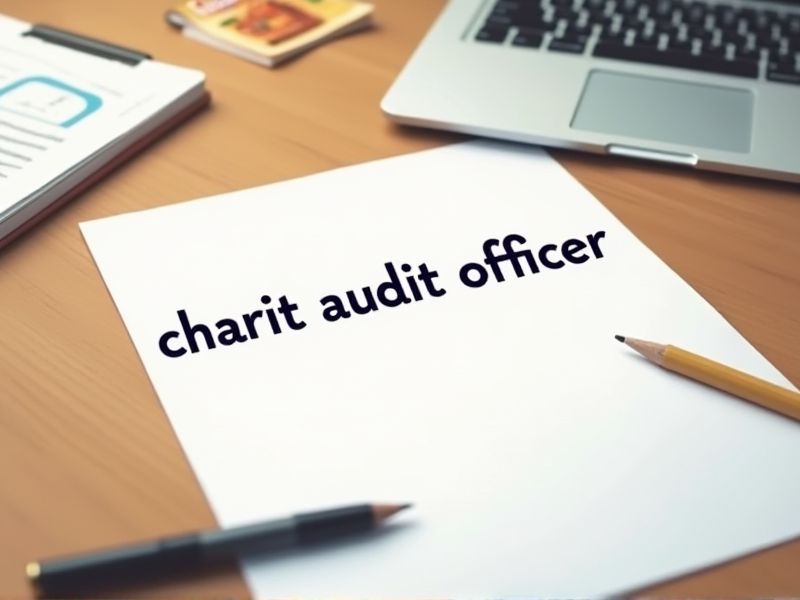
Charity audit officers are responsible for reviewing and ensuring the financial integrity and compliance of nonprofit organizations. These professionals must possess specialized knowledge to navigate the unique financial and regulatory frameworks governing charities. Certifications provide validation of expertise and ensure that an officer is well-equipped to detect any discrepancies or financial mismanagement. Here are some important certifications that can benefit a charity audit officer.
Certified Public Accountant (CPA)
Many charities handle substantial financial resources, and a CPA's expertise in accounting ensures accurate and transparent financial reporting. The CPA's training allows for the identification of discrepancies or irregularities, which helps prevent fraud and enhances stakeholder trust. Compliance with government regulations demands precise financial documentation, and a CPA ensures these requirements are met. As charities often seek donations or grants, having a CPA verify financial integrity can bolster donor confidence and increase funding opportunities.
Certified Internal Auditor (CIA)
A Certified Internal Auditor brings specialized knowledge in auditing practices, which enhances the credibility and accuracy of financial statements for a charity. This certification ensures that the audit officer is well-versed in identifying and mitigating risks, crucial in safeguarding charitable funds. With a CIA's expertise, internal processes are more likely to align with regulatory standards, increasing transparency and trust among donors. The qualification indicates a commitment to ethical standards, vital for maintaining the integrity of a charitable organization.
Certified Fraud Examiner (CFE)
Charity organizations often handle significant amounts of donations, which increases the risk of financial mismanagement or fraud. A Certified Fraud Examiner (CFE) brings specialized skills in fraud detection and prevention, crucial for maintaining trust with donors and stakeholders. CFEs are trained to identify intricate financial discrepancies that could indicate fraudulent activities within a charity. Employing a CFE as an audit officer enhances transparency and accountability, ensuring funds are used for their intended charitable purposes.
Certified Government Auditing Professional (CGAP)
Having a Certified Government Auditing Professional (CGAP) enhances the credibility of a charity audit officer, as it demonstrates expertise in government auditing standards and principles. This certification equips officers with the necessary skills to detect and prevent fraud and ensure compliance with regulations. A CGAP can provide valuable insights into improving financial operations, which can increase public trust in the charity's financial practices. It also ensures that audits are thorough and align with legal requirements, safeguarding the interests of donors and stakeholders.
Chartered Accountant (CA)
Charity organizations require financial transparency to maintain donor trust, which a Chartered Accountant provides through meticulous audits. The expertise of a CA ensures compliance with financial regulations, preventing legal complications for the charity. Efficient financial oversight by a CA helps identify areas to optimize resource allocation, enhancing the charity's impact. Accurate financial reporting by a CA assists in building a robust reputation, facilitating future funding opportunities.
Certified in Risk Management Assurance (CRMA)
Charity audit officers with CRMA certification are equipped with advanced skills in risk management, enhancing their ability to identify and mitigate potential risks in nonprofit operations. This expertise ensures financial integrity and accountability, fostering donor confidence and trust. Understanding internal controls and assurance processes helps charity organizations comply with regulatory requirements. CRMA certification signifies a commitment to high standards, supporting the efficient use of resources in achieving philanthropic goals.
Certified Information Systems Auditor (CISA)
Certified Information Systems Auditor (CISA) certification provides charity audit officers with a robust understanding of information systems auditing, control, and security, crucial for ensuring that financial practices comply with applicable laws and standards. The certification enhances the audit officer's ability to assess an organization's information systems and pinpoint vulnerabilities that could lead to data breaches or financial discrepancies. Having CISA credentials signals to stakeholders and donors that the charity values transparency and accountability in financial reporting and information security. This professional qualification elevates the charity's trustworthiness and minimizes the risk of information-related fraud.
Certified Financial Services Auditor (CFSA)
A Certified Financial Services Auditor (CFSA) possesses specialized knowledge in critical assessment of financial services, crucial for effectively auditing a charity's financial records. Charities, operating with public funds, require transparency and accountability that a CFSA can ensure through detailed financial examination. The CFSA can identify any inefficiencies or irregularities in financial management, improving trust among donors and stakeholders. In-depth understanding of compliance and regulatory standards provided by CFSA certification ensures that the charity adheres to necessary legal and ethical requirements.
Certified Nonprofit Professional (CNP)
A Certified Nonprofit Professional (CNP) possesses specialized knowledge critical for understanding the complex regulations governing nonprofit financial practices, which aids in maintaining legal compliance during audits. This certification equips individuals with strategic skills in financial stewardship, ensuring transparent and efficient use of charitable funds. Expertise in nonprofit management allows a CNP to identify and mitigate potential financial risks, safeguarding the organization's reputation and donor trust. By having a CNP as a charity audit officer, charities can enhance their governance and accountability, ultimately strengthening their mission-driven impact.
Certification in Control Self-Assessment (CCSA)
A Certification in Control Self-Assessment (CCSA) enhances a charity audit officer's ability to identify and mitigate risks, ensuring the organization's funds are used effectively. Possessing CCSA credentials demonstrates a comprehensive understanding of internal controls, leading to more precise evaluations of financial activities. With CCSA certification, an audit officer gains skills in stakeholder engagement and collaborative risk assessments, which are essential in nonprofit environments. The certification can lead to improved audit strategies, increasing overall trust and accountability within the charitable organization.
Summary
By obtaining certifications, you can enhance your credibility and expertise as a charity audit officer. This professional validation often leads to increased trust from stakeholders and donors. With recognized credentials, there are higher chances of career advancement and salary increases. Certifications also equip you with updated knowledge and skills, improving organizational audit outcomes.
